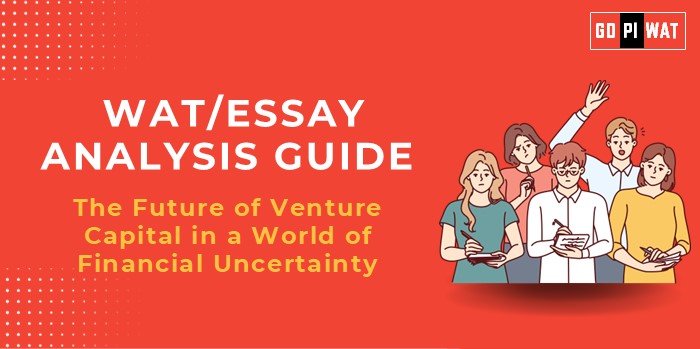📋 Group Discussion (GD) Analysis Guide
🌐 Topic: The Future of Venture Capital in a World of Financial Uncertainty
🌟 Introduction to the Topic
Opening Context: The venture capital (VC) landscape is facing significant challenges, driven by global economic uncertainties, reduced funding, and shifting investment priorities. This evolution poses critical questions about the future of VC in fostering innovation during turbulent times.
Topic Background: Historically, VC has been instrumental in backing startups that redefine industries. However, financial volatility—exacerbated by geopolitical instability and regulatory shifts—demands a reevaluation of traditional investment strategies.
📊 Quick Facts and Key Statistics
- 📉 Global VC Funding Decline: Dropped from $415.1 billion in 2022 to $248.4 billion in 2023—a 40% decrease.
- 💼 Startup Mortality Rate: Over 50% fail within the first five years, exacerbated by reduced funding.
- 🌍 Emerging Markets Share: 25% of global VC funding in 2023, up from 15% in 2018.
- 🌱 Climate-Tech Investments: Declined 40% to $53 billion in 2023, reflecting sector-specific risks.
🔑 Stakeholders and Their Roles
- 💼 Venture Capitalists: Shifting focus to resilient sectors like AI and healthcare.
- 🚀 Startups: Striving to demonstrate sustainability and profitability amidst funding challenges.
- 🏛️ Governments: Supporting VC ecosystems with policy measures and innovation incentives.
- 🏦 Institutional Investors: Diversifying portfolios to mitigate risks.
🎯 Achievements and Challenges
🏆 Achievements
- 📈 Resilient Sectors: AI and healthcare continue to draw investments despite funding declines.
- 🌍 Emerging Markets Growth: Reached a 25% share of global VC funding in 2023.
- 🤝 Policy-Driven Innovations: Public-private collaborations are increasing innovation funding.
⚠️ Challenges
- 📉 Funding Contraction: A 40% global decline limits growth opportunities, especially for early-stage startups.
- 🌱 Sectoral Volatility: Investments in climate-tech fell sharply, highlighting risks in specific sectors.
- 📊 Economic Instability: Inflation and high-interest rates dampen investor confidence.
🌍 Global Comparisons
- 🇨🇳 China: State-backed investments bolster local startups, maintaining momentum.
- 🇺🇸 United States: Silicon Valley experiences reduced funding but retains a competitive edge in innovation.
📋 Case Studies
India: Initiatives like the Startup India Seed Fund Scheme support early-stage funding amidst private investment slowdowns.
📢 Structured Arguments for Discussion
- ✅ Supporting Stance: “Venture capital remains pivotal for innovation, as emerging markets now account for 25% of global VC funding despite economic uncertainties.”
- ❌ Opposing Stance: “The 40% drop in global VC funding reveals the sector’s vulnerability, leading to constrained early-stage investments.”
- ⚖️ Balanced Perspective: “While financial challenges affect venture capital, strategic shifts toward resilient sectors and emerging markets highlight the path forward.”
💡 Effective Discussion Approaches
- 🗨️ Opening Approaches:
- Data-Driven: “Global VC funding fell 40% in 2023, but emerging markets now account for 25% of total funding—what can we learn from this shift?”
- Case Study-Based: “India’s policy-driven startup ecosystem highlights how governments can mitigate funding constraints.”
- ↔️ Counter-Argument Handling:
- Point to opportunities in emerging markets.
- Propose solutions like blended finance models to sustain early-stage investments.
🔎 Strategic Analysis of Strengths and Weaknesses
- ✅ Strengths:
- High potential in emerging markets.
- Resilient investment sectors like AI and healthcare.
- ⚠️ Weaknesses:
- Funding reductions limit early-stage startups.
- Sector-specific volatility, e.g., climate-tech.
- ✨ Opportunities:
- Increasing global share of emerging markets in VC.
- Collaborative funding mechanisms like public-private partnerships.
- ⚡ Threats:
- Economic uncertainties like inflation.
- Sectoral downturns such as climate-tech investment declines.
🎓 Connecting with B-School Applications
- 📚 Real-World Applications:
- Practical insights into startup financing strategies for coursework.
- Connections to subjects like investment management and innovation policy.
- ❓ Sample Interview Questions:
- “How can VCs navigate reduced funding while maintaining innovation?”
- “What strategies can startups adopt to attract funding in uncertain markets?”
- 📖 Insights for B-School Students:
- Explore emerging markets’ role in sustaining VC growth.
- Investigate sector-specific risks and mitigation strategies.


